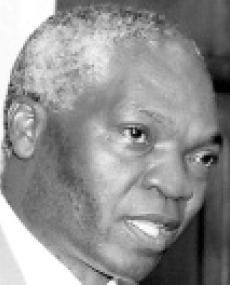
Mandla Langa was born in Stanger, or KwaDukuza, a town in the Natal Province, now known as KwaZulu-Natal Province. He is the son of a preacher, and he grew up in the KwaMashu township outside Durban. He is one of nine children in his family. Amongst his siblings are Bheki Langa, young brother who was South Africa’s ambassador to Russia, and his older brother Pius Langa, who served as chief justice for the Constitutional Court of South Africa, as well as his other brother Ben Langa, a United Democratic Front activist, who was killed in 1984.
Langa attended Gardner Memorial School and Sibonelo High School in Durban. After completing high school, he enrolled at Fort Hare University in the Eastern Cape Province, and he was actively involved in the South African Students’ Organisation. He graduated with a Bachelor’s degree in English and philosophy in 1972. From 1973 to 1974, he taught at Nhlakanipho High School in KwaMashu. From a young age, Mandla Langa showed an interest in art and storytelling.
In 1976, he was arrested and imprisoned for 101 days on charges of attempting to leave the country without a permit, though Langa attributed the cause to his political involvement. Upon his release, he went into exile in Botswana. During his time in exile, Langa continued to produce poetry while fulfilling his political duties. His writing was his way of connecting with home, which he saw as his “perfect universe”. In exile, Langa obtained a journalism diploma in Hungary and London. He wanted to expose what South African media at that time was unable to expose due to state censorship.
He participated in the Festival of Arts and Culture which took place in Nigeria in 1977. Two years later, he visited the United States, then move to Lesotho shortly after. He joined the African National Congress’s armed wing, Umkhonto we Sizwe, receiving training in Angola from 1980 to 1982. He spent time in Mozambique, Zambia, Hungary and the United Kingdom through the 1980s,studying journalism andsholding various ANC posts. Langa was vice chairman for London’s ‘Africa95’ arts and culture festival, and held positions at media entities such as the Independent Broadcasting Authority and the South African Broadcasting Corporation. He has been a weekly columnist for the Sunday Independent and editor at large of LeadershipMagazine.
Some of his writings include short stories such as ‘The Dead Men Who Lost Their Bones’, which won Drum magazine’s 1980 short fiction contest, and Tenderness of Blood (1987), his first novel. He published his second novel, A Rainbow on the Paper Sky, in 1989, followed by a collection of short fiction, TheNaked Song and Other Stories, in 1996. His third novel, The Memory of Stones, was published in 2000, followed by The Lost Colours of the Chameleon in 2008 and The Texture of Shadows in 2014. Collections of multiple writers’ works included his writings in 1990, 1997 and 2004. Langa has written introductions for many books, including South Africa’s Nobel Laureates: Peace, Literature and Science (2004), Moving in Time: Images of Life in a Democratic South Africa (2004) and Youth 2 Youth: 30 Years after Soweto ’76 (2006).
Langa worked on various committees in South Africa, including the boards of Business and Arts South Africa, the Institute for the Advancement of Journalism, the Rhodes University School for Economic Journalism and MultiChoice South Africa Holdings. He has served as a trustee for Nation’s Trust, the Read Educational Trust and the South African Screen Writers’ Laboratory. He worked as CEO of the Independent Communication Authority of South Africa, executive vice president of South Africa’s PEN (Poets, Playwrights, Essayists, Editors and Novelists) and chairman of the judging panel for the ‘Twenty in 20’ short story project.
Langa’s awards include the 1991 Arts Council of Great Britain’s bursary for creative writing, making him the first South African to receive this recognition. A 2003 convention of the Pan African Writers’ Association featured him in its ‘Evening with Mandla Langa’. He received the South African government’s National Order of Ikhamanga in silver in 2007 for literary, journalistic and cultural achievements. In 2009, he received the Commonwealth Writers’ Prize for Best Book: Africa Region.
Some of his famous quotes include:
‘Each generation always imagines that it has a patent on truth. We thought that we were the bees’ knees and knew it all. We did have those icons that we invoked but we also thought that had we lived under those conditions in those earlier years we could have sorted things out then and there. I was fortunate in that I could straddle a number of periods and generations. I could relate to those who were both where I was as a youth and transpose that to where others were as old people. Where we were growing up in Durban there was always that mythical heroic figure of the ANC guerrilla – someone who could infiltrate back into the country and teach military warfare and train cadres. When you heard that one of them had been captured that increased their heroism for us. When I left the country and met some of those people who had been mythologized it was possible to write about the reality and myth of what passes as generational conflict.’
And:
‘I am somewhat familiar with chaos, having had a ringside seat in places where it has unleashed itself and, if truth be told, caused a little bit of it in my days of youth.’
He is a prominent and award-winning writer who continues to champion creativity in the media through the various positions that he has held over the years. Langa is currently the director to the Contemporary African Music and Arts organisation, while concurrently serving on the boards of several institutions, including the Institute for the Advancement of Journalism, the Foundation for Global Dialogue and South African History Online.
He married June Josephs, owner of Xarra Books in Johannesburg, and they have two daughters.